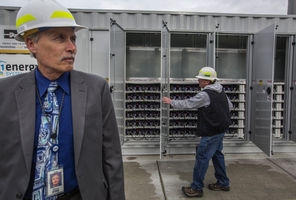 |
|
| By Steve Klein CEO of Klein Tech Advisors Group |
Advancements in energy storage are essential for the future of sustainable energy applications, and significant progress continues to be made by the cleantech sector to meet that challenge. From hardware to software product development and from research in support of “use cases” to seamless intelligent power system integration, Washington State based firms, research institutions and electric utilities are paving the way to a future that can utilize the full potential and value of energy storage.
Washington State energy storage players recognized early on that almost all the energy storage deployments around the globe were handled on a case-by-case design basis with no common software or hardware standards. This led to the formation of the MESA Standards Alliance (mesastandards.org), whose founding members included storage software startup 1Energy Systems, flow battery startup UniEnergy Technologies, global energy technology giant Alstom Network Management Solutions, control technology maker Parker Hannifin, the Department of Energy's Pacific Northwest National Laboratory (PNNL) and the state’s largest electric utilities; Puget Sound Energy, Seattle City Light, Snohomish PUD and Avista. Standards for battery makers, inverter manufacturers, software developers, utilities and financing partners will yield big cost savings compared to the old way of doing things, as well as laying the groundwork for future innovations.
Puget Sound is an area known for its software innovation and success. Seattle startup, 1Energy Systems, is continuing that legacy as a cutting edge energy storage software developer. 1Energy's software uses the MESA non-proprietary communication protocols and supports multi-vendor products for efficient and cost-effective energy storage solutions.
Effective energy storage systems require communications between a multitude of components as well as monitoring and controlling to ensure optimum value. Energy storage is one of many important elements of the extensive electric power system and Redmond, Washington, based company Alstom, provides the overarching Energy Management System software that essentially operates the entire grid. That is why 1Energy Systems and Alstom are both working in Washington State to drive innovative solutions to facilitate energy storage applications while ensuring the reliability and security of the grid.
At the same time northwest energy storage leaders were driving the development of global energy storage standards, PNNL was performing groundbreaking work in battery chemistry, which led to the development of a new generation vanadium redox flow battery system. This technology was put into production in Mukilteo, Washington, by UniEnergy Technologies. UniEnergy has now built and sold utility scale energy storage systems that are taking performance and applications to a new level.
While the progress described above was moving the northwest into a position as a leader in the development of energy storage technologies, the number of actual physical deployments demonstrating energy storage applications in Washington State were rather limited. That changed in 2013 when the state legislature and governor provided a competitive challenge and economic boost through the Clean Energy Fund. Three of the state’s largest utilities, Avista, Puget Sound Energy and Snohomish PUD were chosen and provided multi-million dollar grants to deploy energy storage devices and related information technology to improve reliability and efficiently integrate intermittent utility scale renewables and distributed generation. Additionally, PNNL was brought in to perform use case analysis on all the energy storage systems.
As the need and demand for the integration of more intermittent resources such as wind and solar grow, the electric grid requires an effective and efficient means to store and discharge energy that more closely matches consumer needs. Energy storage has been viewed for some time as the “holy grail” solution to our energy challenges. While Indiana Jones is unlikely to solve this challenge, Washington State has already proven that it is a leader in the development of energy storage. The examples described here are just a small sampling of the activities going on in the state that will not only move the industry forward but will provide local jobs and economic development. The market for energy storage products and services is global and expansive. The vision and talent of Washington State cleantech companies is laying the foundation for the northwest as a global leader in energy storage products and services.